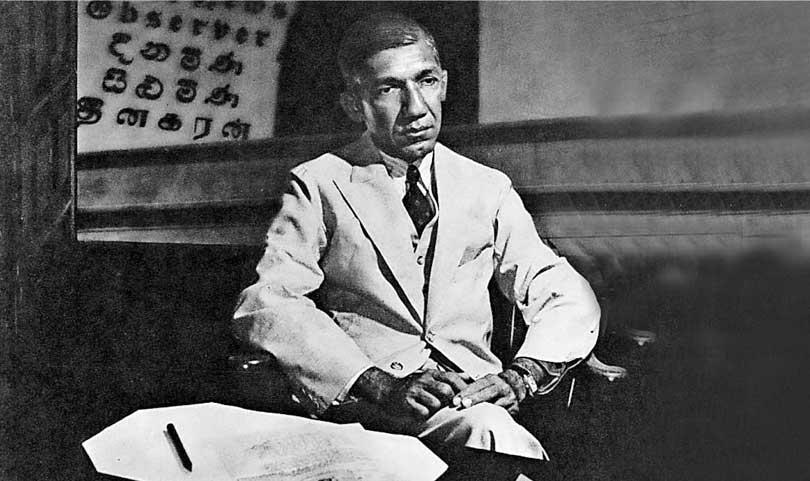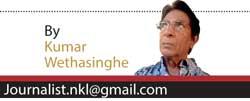Reply To:
Name - Reply Comment
Last Updated : 2024-04-26 02:12:00

 The nation pays its tribute to one of Sri Lanka’s distinguished patriots annually on February 23. Today is the 135th Birth Anniversary of Don Richard Wijewardene (D.R). The general public of our country eternally remembers and respects him as the ‘Father of Print Media’ of this island nation.Through his cluster of newspapers D.R, spearheaded the independence struggle at its peak moment. Nevertheless, his vision and mission and his unique contributions, to awaken the citizens and compel the imperialists to free our nation, were always activities performed behind the scenes. It is an irksome task to summarise his commitment towards the attainment of political independence to Sri Lanka. His media weapon educated the masses, stimulated the political and social consciousness and created greater awareness of our national cultural heritage. D.R hailed from a distinguished family. His parents were Muhandiram Don PhilipWijewardene and Helena Wijewardene, a lady held in high esteem for her services rendered to the Sambuddha Sasana. He was educated at S. Thomas’ College, Mutwal. Among his colleagues were Senanayake brothers F.R and D.S. Later he proceeded to London and obtained a degree as a Barrister-at-law from the Cambridge University. At Cambridge he was at Peter House. Coincidentally Shri Jawaharlal Nehru, who later became India’s Prime Minister, was his contemporary, but he was at Trinity House. Among his Sri Lankan colleagues at Cambridge were Sir Ernest De Silva, the first Chairman of Bank of Ceylon, A E Keuneman, a judge of Supreme Court and C.H.Z Fernando, a legislative councillor.
The nation pays its tribute to one of Sri Lanka’s distinguished patriots annually on February 23. Today is the 135th Birth Anniversary of Don Richard Wijewardene (D.R). The general public of our country eternally remembers and respects him as the ‘Father of Print Media’ of this island nation.Through his cluster of newspapers D.R, spearheaded the independence struggle at its peak moment. Nevertheless, his vision and mission and his unique contributions, to awaken the citizens and compel the imperialists to free our nation, were always activities performed behind the scenes. It is an irksome task to summarise his commitment towards the attainment of political independence to Sri Lanka. His media weapon educated the masses, stimulated the political and social consciousness and created greater awareness of our national cultural heritage. D.R hailed from a distinguished family. His parents were Muhandiram Don PhilipWijewardene and Helena Wijewardene, a lady held in high esteem for her services rendered to the Sambuddha Sasana. He was educated at S. Thomas’ College, Mutwal. Among his colleagues were Senanayake brothers F.R and D.S. Later he proceeded to London and obtained a degree as a Barrister-at-law from the Cambridge University. At Cambridge he was at Peter House. Coincidentally Shri Jawaharlal Nehru, who later became India’s Prime Minister, was his contemporary, but he was at Trinity House. Among his Sri Lankan colleagues at Cambridge were Sir Ernest De Silva, the first Chairman of Bank of Ceylon, A E Keuneman, a judge of Supreme Court and C.H.Z Fernando, a legislative councillor.
D.R’s undergraduate days became a turning point in his life. When he completed his law degree D.R was called up to the Bar at The Inns of Court in London. Yet, he was determined to serve his motherland. In 1943 for the twenty-fifth anniversary of the Ceylon Daily News, Wijewardene allowed certain reminiscences of his student life to be published. He wrote “My interest in politics began during my undergraduate days at Cambridge. There were kindred spirits from India, Ceylon and other parts of the East. There was a wave of unrest in India. As a result there was Lord Curson’s action in partitioning Bengal and prominent Indian leaders visited England and addressed meetings. These meetings were held to enlighten the British public of the situation in that country. Among them was Lal Lajpat Raj, a great nationalist and scholar, Bepin Chandra Pal and Surendranath Banerji, generally known as the silver-tongued orator of Bengal. There came to London also Gopal Krishna Gokhale, a member of the imperial Legislative Council, a man who had made great sacrifices in the services to his country. His was a towering intellect and he was as respected by his countrymen. He impressed upon me that every educated young man, Indian or Ceylonese, had a part to play in the public life of his country and must be prepared to make sacrifices for his country’s welfare. I met Gokhale often at the National Liberal Club and had many long and interesting talks with him on political questions of the day. He asked me to accompany him on his great mission to South Africa as one of his secretaries. To my great regret I was unable to accept his invitation. (Mahathma Gandhi,who was practising as a lawyer in South Africa, was engaged in a struggle to secure civic rights for Indians settled in that country. Wijewardene was perhaps too much imbued with the spirit of Victorian Liberalism to feel at home in such a milieu, but for thirty years his newspapers published more news and articles about Gandhi and his campaigns for the liberation of India than about any other man).
Stirred nationwide sentiments
“One of the best friends Ceylon and Indian students had in London in those days was F.H.M. Corbet, to whom I owe a great debt of gratitude. For many influential friends in and outside Parliament, incidentally, it was in his Chambers that I first met E.W. Perera, who was even then a keen politician and displayed many of the qualities which gave him a leading position in the legislature many years later.
Every mail from Ceylon brought news of popular discontent with the reactionary administration of Sir Henry McCallum, the Governor. Mr Corbet showed me the ropes in the delicate task of interesting members of Parliament in the domestic affairs of a Crown Colony. Among those whom I was able to interest was Sir Henry Cotton, who put the first question in the House of Commons on the desirability of extending the principle of representative government in Ceylon. Sir John Jardine, Sir Herbert Roberts, the leader of the Welsh Liberals, and Mr A McCullum Scott, were stout champions of the subject of people”. Besides the World War in 1914 and communal riots erupted in Sri Lanka. Henry Pedris was executed by British for alleged incitement of race riots: a charge which was later proven false. Scores of National Reform Movement leaders were imprisoned including D. R’s brother Alexander.As a young Barrister, D.R. briefly practised at Hulftsdorp. During the period D.R was commissioned to serve in the British Army. Amidst all challenges he embraced the newspaper career.While still an undergraduate D.R involved himself when the National Reform Movement visited London to meet the Colonial secretary Col. Seely in 1909. The delegation comprised H.J.C. Perera, F.H.M. Corbet, K Gomes, J.W. de Silva, David Rockwood and E.W Perera. That E.W was a great patriot of the day. And in 1908 he was engaged in searching the Royal standard of our last king Sri Wickrama Rajasingha. In association with D.R, and after long deliberations, it was discovered from among the Colonial flags at the Chelsea Military Hospital, London.
The flag was dilapidated and remained in a sorry state. It was D.R who commissioned M/s Southwood & Co., Regent Street, London to restore the flag to its original glory and brought it back to the motherland. When the nation became politically independent in 1948 the ‘Father of the Nation’ Rt. Hon. D.S. Senanayake hoisted this as our National flag. Besides, D. R’s deep news sense, he published a colour print of the Royal flag in his newspaper ‘Dinamina’. It almost stirred nationwide sentiments of our heritage and identity. In 1911, Sir Ponnambalam Ramanathan was elected the first educated Ceylonese member of the legislative council.
Under his leadership, Ceylon Nation Association was established in 1917 with D.R as its secretary. The association geared up reform activities such as the abortion of Paddy Tax, Waste Land Bill etc. D.R ‘s influence and close links with both Donoughmore and Soulbury Commissions as well as Sir Ivor Jennings yielded vast benefits to gain National Freedom.
This is evident by the correspondence exchanged between them. D.R was married to the second daughter of Meedeniya Disawa and his Kumarihamy, Alice Gertrude Ruby. They had five children, all were given Sinhala names. It is mentioned that D.R admired the British Character and way of life, but never impaired his respect for the national traditions at home. He had insisted that his family properly observed Sinhala New Year traditions and had even adopted the age-old custom to boil milk even at the inauguration of the massive ANCL building. H.J.C. Hulugalle, renowned author of his biography, in conclusion of his great volume states “He sought no rewards other than those which promoted the efficiency, influence and prestige of his newspapers. After the country achieved political independence, The Prime Minister pressed him to accept a knighthood in recognition of his services to his people. Wijewardene refused it because he did not wish to compromise in any way the independence of his newspapers.
Whether democracy will succeed or not in Ceylon will depend even more on the character of her leaders”.

Add comment
Comments will be edited (grammar, spelling and slang) and authorized at the discretion of Daily Mirror online. The website also has the right not to publish selected comments.
Reply To:
Name - Reply Comment
US authorities are currently reviewing the manifest of every cargo aboard MV
On March 26, a couple arriving from Thailand was arrested with 88 live animal
According to villagers from Naula-Moragolla out of 105 families 80 can afford
Is the situation in Sri Lanka so grim that locals harbour hope that they coul